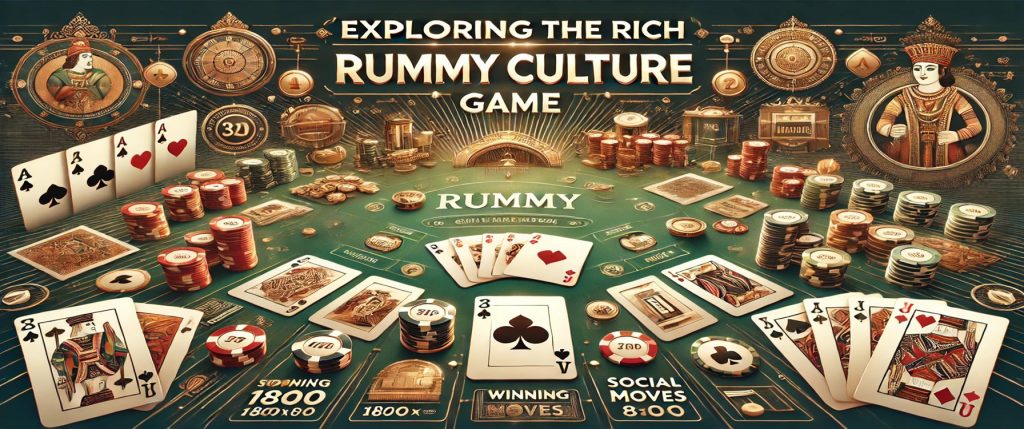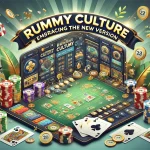
The Complete Handbook of Rummy: History, Variations, Strategies, and More The card game rummy, which has enthralled players for centuries, has a rich & diverse past that dates back to the early 1800s. Although the game’s exact origins are still somewhat unknown, it is generally accepted that Rummy developed from earlier card games like the Mexican-originated Conquian. Conquian, which uses similar card-melding techniques to create sets and runs, is frequently considered the forerunner of contemporary rummy. The wide variety of Rummy variations that we see today is the result of the game’s many adaptations as it traveled across borders.
Rummy arrived in the US by the late 1800s, where it quickly became a household name and enjoyed enormous popularity. Other card games started to influence and be influenced by Rummy as it developed further. A major turning point in the history of the game was the introduction of Gin Rummy in the 1930s, which kept the main goal of creating melds while simplifying some of the original rules. Film stars of the era helped popularize this new variation, which swiftly became a player favorite.
Due to the game’s versatility, it has flourished across cultures, giving rise to distinctive regional variations like Kalooki and Indian Rummy. Rummy is no longer only played in homes these days; it has also made the leap to the digital sphere, where players can interact & compete from all over the world through online platforms. The game of rummy is not a single entity; rather, it has numerous variations that accommodate varying tastes and abilities. With two players usually playing, Gin Rummy is one of the most popular variations. Players’ goal in this version is to minimize the number of points in their unmatched cards while forming sets and runs.
Because of its strategic depth and fast-paced gameplay, the game is popular among competitive players. Indian Rummy is another popular variation that is played with two decks of cards and frequently has more than two players. With particular rules pertaining to jokers that add another level of complexity, this version places an emphasis on creating valid sets and sequences. Other noteworthy variants include Contract Rummy, in which players must fulfill predetermined contracts in every round, and Kalooki, which adds more meld rules and allows for the use of multiple decks. Due to player preferences and cultural quirks, each variation adds a distinct flavor to the game.
Indian Rummy, for example, encourages a more social setting with its larger player base and complex rules, whereas Gin Rummy concentrates on solo play and short rounds. In addition to keeping the game interesting, this diversity enables players to experiment with various tactics & play styles. It is crucial for both novice & experienced players to comprehend the Rummy rules in order to improve their gaming experience. Fundamentally, the goal of Rummy is to create runs—three or more consecutive cards of the same suit—and valid sets—three or four cards of the same rank.
Each player draws a card from the discard pile or the stockpile, & at the conclusion of their turn, they discard one card. The game goes on until a player reaches a set score limit or successfully melds all of their cards. Although these fundamental guidelines are applicable to all variations of Rummy, some may add new guidelines or subtleties that players need to be aware of. It takes more than just a firm grasp of the rules to win at rummy; you also need to understand psychology and strategy. Players need to be very aware of what their opponents are doing and use their hand skillfully.
This includes not just creating melds but also deliberately discarding cards that could help opponents. In certain variations, players can also keep unmatched cards below a specific point value and “knock” or declare their hand when they think they have formed legitimate melds. A player’s chances of winning this captivating card game can be greatly increased by becoming proficient in these guidelines & tactics. Rummy players who want to succeed must create strategies that work in a variety of scenarios and against a range of opponents. Players can learn a lot about their opponents’ hands and make well-informed decisions about which cards to keep or discard by carefully examining their discards.
It could be a sign that an opponent is not pursuing that suit for their melds if, for example, they routinely discard cards from that suit. On the other hand, keeping cards that are regularly thrown away by others can backfire because it could indicate that they are less likely to contribute to legitimate melds. Effective hand management is another essential component of learning Rummy. Instead of concentrating on finishing a single meld, players should try to create several possible melds at once. This method not only improves adaptability but also makes it possible to adjust to shifting conditions while playing.
A player’s chances of forming melds quickly can also be greatly increased by strategically using jokers or wild cards. Players can improve their Rummy skills & gain a competitive advantage in every game by combining these tactics with astute observation and flexibility. Beyond merely being a card game, rummy is a social interaction tool that unites people from all walks of life.
Rummy encourages relationships between players through friendly competition and shared experiences, whether it is played at competitive tournaments, family get-togethers, or friendly get-togethers. The social aspects of the game naturally promote dialogue and friendship as players joke around & plan their next moves. This feature of rummy makes it especially appealing to people who want to engage with friends and family in a meaningful way in addition to having fun. Also, Rummy’s popularity as a social activity is influenced by its accessibility. Even inexperienced players can enjoy themselves without feeling overwhelmed thanks to the easy-to-learn rules. Through a mutual love of the game, this inclusivity enables a variety of groups to gather around the table, overcoming age and cultural barriers.
Rummy turns into a platform for storytelling and laughter as players connect over both wins and losses, forming enduring memories that go beyond the game’s boundaries. There are many advantages to playing rummy that go beyond simple enjoyment; it’s a great way to stimulate your brain. Players must use critical thinking skills and make snap decisions based on insufficient information to navigate the strategic elements of the game. Players must remember which cards have been played and predict possible opponent moves, which helps them develop their memory. Rummy is a fun way to keep the mind active because studies have shown that playing mentally challenging card games on a regular basis can eventually improve cognitive function.
Playing rummy can help you de-stress and relax in addition to stimulating your mind. Players can temporarily escape from the stresses of everyday life & lose themselves in a world of strategy and competition by concentrating on the game. Rummy provides an opportunity for people to relax while still keeping their minds active, whether it is played in a more serious setting or more casually with friends. For those looking for a game that offers both enjoyment and cognitive benefits, rummy is the perfect combination of mental challenge and relaxation.
Playing in tournaments can be an exciting experience for people who have perfected their Rummy skills and want to further develop their love for the game. Players have the opportunity to display their skills against others who share their passion for the game through a variety of local, national, and international competitions that are regularly held. Competent players from a variety of backgrounds frequently attend these tournaments, fostering an exciting environment full of rivalry & friendship. Players can test their abilities and gain important knowledge by participating in rummy tournaments, which expose them to a variety of playing techniques and styles. Because many tournaments have several rounds with different formats, players can modify their strategy in response to their opponents’ moves.
Successful tournament play can also raise one’s profile in the gaming community, which can lead to sponsorships or other competitive opportunities for committed players hoping to establish themselves in the rummy world. In the same way that technology is developing at a never-before-seen rate, card games like Rummy are also evolving. Players’ interactions with this traditional hobby have been completely transformed by the emergence of online gaming platforms, which enable them to communicate with people worldwide. Features like real-time multiplayer gameplay, customizable rule sets, and even virtual tournaments that mimic the thrill of live competitions are all available in online versions of Rummy.
The game has been given new life by this digital transformation, drawing in younger players who might not have previously played traditional card games. Also, we can anticipate more advancements in the field of rummy as cultural influences continue to shape gaming experiences globally. There might be new variations that incorporate themes from popular culture or combine traditional elements with contemporary twists. Also, more complex computer opponents for training or solo play may become available as artificial intelligence advances.
Rummy appears to have a bright future as it adjusts to modern times while maintaining its essential qualities as a popular card game, guaranteeing ongoing enjoyment for both die-hard fans and novices. In summary, rummy is more than just a card game; it’s a complex fabric influenced by social interaction, strategy, history, and culture. As a result of its development over time, there are now many variations that satisfy a wide range of tastes while still achieving its main goal of combining cards into sets & runs.
Players help to ensure that this age-old activity remains one of the most beloved card games in the world by continuing to play it at both conventional get-togethers and contemporary online.





